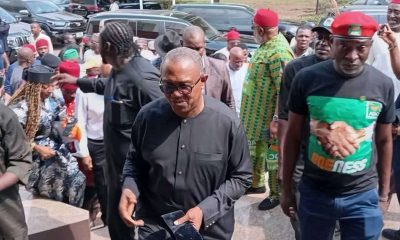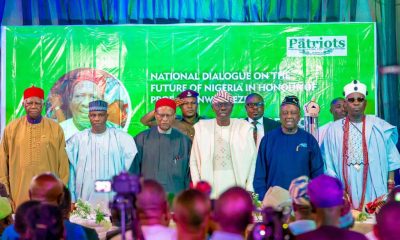Politics
Defiant Tambuwal dares Presidency, as EFCC targets more opposition figures

Aminu Tambuwal, the immediate past governor of Sokoto State, and a serving Senator, has thrown down the gauntlet to the Economic and Financial Crimes Commission (EFCC), declaring that no amount of intimidation will silence him.
The former governor’s remarks came in the wake of his recent arrest and detention by the anti-graft body, a move widely seen in opposition circles as part of a larger political offensive orchestrated by the presidency.
Tambuwal was held by the EFCC for nearly 24 hours over allegations of mismanaging N189 billion during his tenure as governor, charges he flatly denies. He was, subsequently, released on administrative bail, but not before sparking a storm of reactions across Nigeria’s political landscape.
The arrest, many insist, was not an isolated act of anti-corruption enforcement, but the latest chapter in what they describe as President Bola Tinubu’s campaign of political persecution. Even the EFCC gave much indication of this, when its Chairman Olukayode said six other former governors will soon be brought in for questions.
His detention triggered a wave of outrage within the African Democratic Congress (ADC), the opposition coalition platform that has emerged as the most potent threat to Tinubu’s second-term ambition in 2027. For many in the camp, the EFCC is no longer an impartial anti-graft watchdog, but a weapon in the president’s arsenal, deployed to weaken and destabilize his adversaries.
Eyes On 2027
“Tambuwal is the second ADC leader EFCC has gone after all of a sudden, with Emeka Ihedioha, another prominent ADC leader, Tinubu’s lap dogs are after,” noted Stephen Osemwegie, a rights activist, and former governorship aspirant in Edo State.
“That this witch-hunt is politically motivated is not the issue, but that Tinubu is no longer hiding his desperation for power after two years of corruption and incompetence under his sleepy eyes. A clear and present danger to Nigeria’s democracy is what Bola Tinubu’s regime has become. The question you should be asking is, who is next?”
Osemwegie’s concerns echo the fears of many Nigerians, who have watched the EFCC’s recent activities with growing unease. Opposition figures believe that Tambuwal’s arrest signals the start of a broader onslaught aimed at silencing dissent, and crippling the coalition before 2027.
Indeed, whispers in political circles suggest that Tambuwal is only the beginning. Former Senate President David Mark, ex-Imo governor Emeka Ihedioha, and another former Senate President, Bukola Saraki, are reportedly on the commission’s radar.
When Business Hallmark contacted EFCC’s spokesperson to confirm whether Ihedioha, or Mark, had been invited, as suggested in a letter circulating online, the spokesman declined to respond. Repeated calls to his phone went unanswered, and a text message inquiry was ignored.
To the opposition, the silence from the EFCC is telling. “If there’s nothing political about these arrests, why the selective targeting?” asked a senior ADC figure, who requested anonymity. “Why does it seem that only those critical of the government find themselves suddenly accused of billions in fraud?
“We saw the likes of Abdullahi Ganduje stuffing dollars, but he was made party chairman, and later appointed chairman of FAAN board. It is clear that, like Adams Oshiomhole suggested, once you are in APC, your sins are forgiven. Look at even Godswill Akpabio, who is currently the senate president. What about Orji Uzo Kalu, and so on? The EFCC is a joke.”
No Retreat, No Surrender
For Tambuwal, the political undertones were unmistakable. Emerging from detention, he made it clear he would not be cowed. His Sokoto and Abuja residences quickly became rallying points, attracting visits from top opposition figures including Rotimi Amaechi, David Mark, and Hajiya Najatu Mohammed.
“Tinubu is ADC’s campaign coordinator in 2027,” Najatu quipped in Hausa during her solidarity visit. To her, the so-called witch-hunt was a gift in disguise, one that would only burnish the coalition’s image, and rally the masses to its cause.
The response on the ground seems to bear her out. Since his release, Tambuwal’s political stock has risen sharply. Videos of his convoys being mobbed by jubilant supporters have gone viral on social media, fuelling a narrative of resilience in the face of oppression. In Sokoto, thousands thronged his home to welcome him back, treating him as a hero of defiance, rather than a man under suspicion.
Tambuwal’s ordeal is only the latest in a pattern critics say has become all too familiar under Tinubu’s presidency: the strategic use of security agencies to weaken opposition ranks.
His arrest, many analysts argue, is a deliberate attempt to weaken the opposition ahead of 2027 by projecting its key figures as corrupt and, therefore, unworthy of public trust. While the EFCC insists that its investigations are apolitical, critics say the patterns are too consistent to be dismissed as coincidence.
Former Vice President Atiku Abubakar, who remains the most recognizable figure in the opposition bloc, was among the first to issue a scathing statement after Tambuwal’s detention. He accused President Tinubu of “weaponizing state institutions to intimidate political rivals,” and warned that Nigeria risked sliding fully into dictatorship if such acts were allowed to continue unchecked.
“This is not about Tambuwal alone,” Atiku said in a statement circulated by his media team. “It is about the very survival of our democracy. Once you criminalize opposition, you have destroyed the foundation of plural politics. Tinubu cannot turn the EFCC into his personal police force.”
Atiku’s remarks echoed those of other opposition leaders, including Peter Obi of the Labour Party, who, though not formally in the ADC-led coalition, has consistently spoken against what he describes as the “persecution of political opponents under the guise of anti-graft crusades.”
“The fight against corruption is too important to be trivialized by partisan targeting,” Obi told journalists in Awka. “Nigerians want accountability, but they want it across the board, not a selective pursuit of those, who oppose the ruling party.”
A growing list of targets
Already, whispers within political circles suggest that several high-profile names are next on the radar. Letters purporting to be invitations from the EFCC to David Mark and Emeka Ihedioha have been widely circulated online. While Business Hallmark reached out to the EFCC’s spokesperson to verify the authenticity of the letters, he neither answered calls to his phone line, nor replied to text message inquiries.
The silence has only deepened suspicion. To opposition strategists, the apparent lack of transparency confirms that a major sweep is underway, designed to keep the coalition on the defensive, rather than focused on building a viable challenge to Tinubu in 2027.
A source within the ADC’s national secretariat, who requested anonymity, claimed that “at least six other prominent figures” are on the EFCC’s list, including former governors, senators, and a handful of financiers believed to be bankrolling the coalition’s activities.
“What is happening is nothing short of a purge,” the source said. “They want to cripple us financially and morally. But we will not be silenced.”
In an official statement last week by its acting National Publicity Secretary, Bolaji Abdullahi, the ADC said the EFCC had embarked on a “choreographed media trial” against coalition leaders after the detention of Tambuwal on Monday, and the invitation of Ihedioha, who left his short-lived office almost eight years ago.
“The EFCC has now surreptitiously started excavating all the files from David Mark’s tenure as Senate President, 10 years after he left office,” Abdullahi said, questioning the timing of the investigations.
“The pattern of ignoring APC stalwarts with fresher and well-documented cases, while targeting opposition figures with stale allegations, is proof of selective justice, and an assault on political freedom.”.
Business Hallmark reached out to Abdullahi at the weekend to provide specific information about his claims and to confirm Ihedioha’s alleged invitation, but he did not respond.
The EFCC’s stance
The EFCC, for its part, has strongly denied allegations of partisanship. In a statement issued earlier this week, the Commission maintained that its investigations were guided strictly by evidence and not by political calculations.
“The EFCC does not and will never act on the dictates of any political party, or individual,” the statement read. “Those invited or detained have cases linked to petitions and verified financial records. The fight against corruption must be insulated from political sentiment.”
Yet, critics point out that similar language has accompanied almost every EFCC action since its inception, even when patterns of selective justice became undeniable. Under Tinubu, they argue, the commission has grown even less restrained, pursuing mostly opposition politicians while appearing blind to controversies swirling around members of the ruling APC.
Whether, or not, the EFCC’s case against figures like Tambuwal hold merit, perception is proving decisive. For many Nigerians, especially within opposition strongholds, the arrests are seen less as legal actions than as political theatre.
“EFCC isolating and inviting coalition for a better Nigeria leaders shows the ploy to divide opposition votes, as neither PDP, nor LP is working, said IKECHUKWU, @iykimo, a popular commentator on X.
“Plan B activated: Scare ADC leaders with EFCC. Plan C: Use the courts to instigate crisis in ADC. Last kick of a dying horse”
This view was amplified by Opeyemi Timothy Oyeleke, @Lugard100, a democracy advocate and supporter of Omoyele Sowore, presidential candidate of the African Action Congress (AAC) in the last election. “I haven’t heard since 2015 that EFCC went after any APC member. It has always been used against oppositions and perceived political enemies,” he said. “This is not good for our democracy!”
Political insiders argue that Tinubu, a master tactician from his Lagos years, knows the value of timing. By unleashing the EFCC two years into his presidency, he ensures that opposition leaders spend the next year fighting court cases rather than mobilizing. By the time the election season approaches, they may be too weakened to mount a serious challenge.
But this strategy is not without risks. If Nigerians perceive it as blatant persecution, it could backfire spectacularly, turning opposition figures into martyrs, and fuelling an anti-incumbency wave.
“Tinubu is playing with fire,” warned Chidi Anthony, a lawyer and political analyst based in Abuja. “History is replete with leaders, who overplayed their hand and ended up strengthening the very opposition they sought to crush.”








